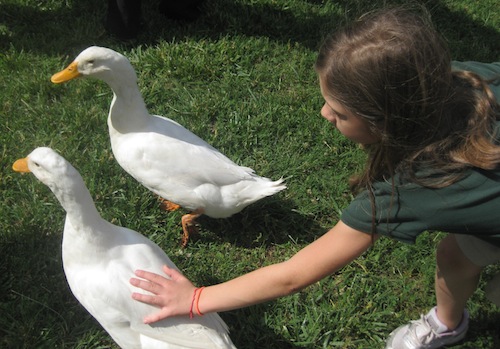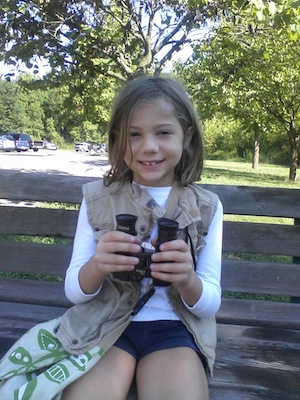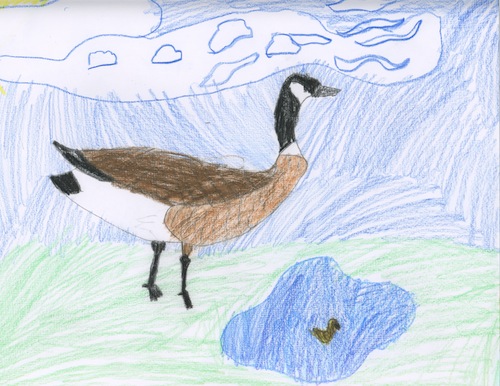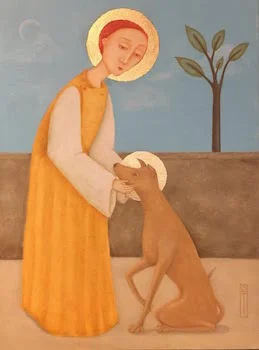My family is fortunate to live near one of Nashville’s most beautiful spaces — a nature park featuring bike paths, walking trails, diverse foliage, many species of birds and bugs and other wildlife, and “Lake Sevier,” a large duck pond. The park was an outlet for this stir-crazy mama when the girls were small, and a favorite spot for berry picking and nature play once they were old enough to explore. The park also became a favorite for our visitors, and feeding the ducks became a tradition. I remember my girls throwing chubby-handed fistfuls of rejected heels of bread to the eager geese and ducks while friends, grandparents, aunts, and uncles captured the moment — an image to develop later, a memory to unpack when they walked back through their own doors and their hearts began to ache.

I understand that traditions, even simple ones like feeding the ducks, can create strong emotional responses, and maybe this is why I cringed one year ago when my then eight-year-old daughter Sera piped up in the back seat of the car, “Mama? I want to make a sign to put up at Shelby Park — to tell the people that it’s bad for the ducks to eat bread.” You have got to be kidding. I was not completely ignorant of the negative implications of feeding a duck bread, but there were a number of reasons why I dismissed the desire of my dear daughter’s heart.
It’s hard to break tradition. This is true for us as individuals, but expand this to include sermonizing an entire community — an entire city — on the evils of good old-fashioned duck feeding. I did not want to be the one, not that one. Despite what her conscience was telling her, I was not on board.
January of this year I began an environmental science course — as an ecology minor, I very much looked forward to it. In the first class meeting, we were told that we would be completing an individual project related to the environmental issue of our choice. I sat there contemplating a thousand heroic (probably a little too heroic) ideas, but in a whisper, in the back of my mind, came Sera’s tiny voice. The idea, posed a year earlier and buried by my own pride, fear, and laziness, resurfaced like the first sprouts of spring under winter snow. I decided to go ahead with the project, but I still had doubts. I didn’t know where to start or whom to talk to, and I was insecure and worried that the project I had chosen was too insignificant, too elementary.
We walked into the Shelby Nature Center with Sera’s conviction, my skepticism, and the promise that we would do whatever we could to raise the money to put up signs around the pond. Sera spoke first — she addressed the problem with confidence, clarity, and wisdom.

We had been driving in the car when Sera first mentioned the idea to me, so I was paying more attention to the road in front of me than the girl in the backseat with dreams of saving the ducks. But there in the Nature Center — the place in which she had earned her bird-watching badge just a year earlier — with all eyes on her, I saw it: reflected in her face was the image of a loving God who cares for and sustains creation.
I listened, profoundly encouraged by the faith of my own child. Sera knew nothing of politics, partisan agenda, or the annoyance of families arriving at the lake with a loaf of stale bread, but she knew the voice of her Shepherd — the still small voice that moved her to act from her conscience. How many times have I rejected that voice? Out of pride, fear, or laziness, I have often stifled the murmurs of the Holy Spirit; Sera listened without fear, and because she has not yet encountered the divisiveness of politics, she responded neither with desperation nor denial but with obedience.
I was also humbled by her desire to care for the seemingly insignificant things. It is a passion of mine to raise awareness within the Church for better care of God’s creation. However, I struggle with my own insecurity that it isn’t meaningful enough. Human trafficking, war, and other atrocities occur all around us; who has the time to save a duck? Matthew 6:26 says, “Look at the birds of the air: they neither sow nor reap nor gather into barns, and yet your heavenly Father feeds them. Are you not of more value than they?” We tend to focus on the part of this Scripture that emphasizes our value and the love our Father has for us, and while that is completely true, let us not forget that this verse also points to God’s love and care for the sparrow. Is not Scripture full of examples of God’s love for the overlooked? For the widow, the orphan, the shepherds, the sinner, and the sparrow — indeed for the whole of creation, God has poured Himself out and promised redemption.
I remembered the great and mysterious truth: God uses us in that redemption, and by caring for the least of these, my daughter was an instrument in preserving and displaying the glory of God. We sing about it in our worship songs, and we feel it when we look upon the carefully crafted mountains or the divinely appointed sunset. We declare it as we read Psalm 19:1, “The heavens declare the glory of God, and the sky above proclaims his handiwork,” but do we believe it? Do we find value in it? When we regard the earth with care, as a gift of God, it should grieve us to watch His glory and handiwork become sullied and exploited. If the skies reveal God’s truth, should we not be moved to protect them?
The little lake at Shelby Park is at risk of contamination from over-feeding, but when the lake is clear, it beautifully reflects the blue skies of God’s glory the same way His character is displayed in the tender eyes and serving heart of my girl — my little bird caring for the birds.
I stood in the Shelby Nature Center considering all of these things as she ended her speech with, “So I was thinking we should put a sign in the ground to tell people not to feed the ducks.” I smiled at her candor and waited a little anxiously. The director and the resident naturalist both looked at Sera, grinned, and excitedly rallied behind the cause, telling her that they thought it would be a fantastic idea.
We discussed the logistics, agreed that a duck pellet dispenser would provide an alternative to traditional bread (and lessen the environmental impact of feeding), and plotted a strategy. I walked away from the office with an action plan, and my girl walked away full of the peace and joy that comes from following the call of Jesus.
Sera and her younger sister Amelie are now busy creating and coloring original pictures of ducks and geese to raise money for the project, and I am donating music sales. The project continues to remind us that like a healthy ecosystem, God gives us all diverse strengths and gifts. We can be artists, theologians, scientists, and missionaries all committed to the same work. And while some are called, like Christ, to fight the weighty injustices of the world, some are called, like Christ, to pay attention to the seemingly insignificant. On heaven and on earth, in creation and in the hearts of little girls who follow the whispers of the Spirit, God is glorified.

Flo Paris Oakes is a musician and a writer whose passions include good food (both eating and making), literature, creation care, and especially the convergence of all three. Flo lives in East Nashville with her husband and two daughters and blogs at Tales of a Music Mama.
















